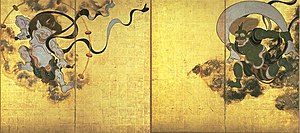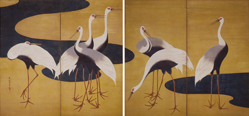While in some countries you can see movie posters on every wall and others have slogans of revolutionary movements, Japan tends to have beautiful posters of temples and museums in store windows and train stations.
In the case of temples, as religion has become less important for most Japanese, the cultural practice of seasonal tourism has conversely become a more important source of revenue. Hence the posters that extol the beauty of a temple in the spring and fall, especially at night time when lighted. This is one is from Shoren-in, a small temple in Higashiyama in the Eastern part of Kyoto.
A more famous temple in Kyoto, Kiyomizudera is shown dramatically in relief against the Kyoto skyline. To see this view at night would involve a trudge through the paths on the other side of temple and a climb up the hill to look back.
I actually prefer to visit the temples during the day in natural light before the crowds arrive for the evening though this poster from Nara illustrates how beautiful the temples can look under the night sky.
Another common subject is the storehouse of treasures that temples have gathered over the centuries and periodically put on display to the public. This one is for an exhibition of treasures from Miidera Temple, one of the largest temple complexes in Japan.
Museums and historical sites, a designation that covers almost every town in the country, have posters that highlight their unique features. This scenic poster is for a train ride to see the Maples changing colors during the Koyo Matsuri festival.
Museums are always showcasing their holdings and special exhibits with posters such as this one on artifacts from the time of the great 9th century scholar Sugawara no Michizane.
I like this very simple and dignified poster for Raku pottery showing a cup used in the Tea Ceremony.
One of the interesting sights for foreigners in Japan is the sight of women in traditional garb at temples and historical locations, something the Kimono Passport promotes through reduced admission for those visiting in kimonos.























